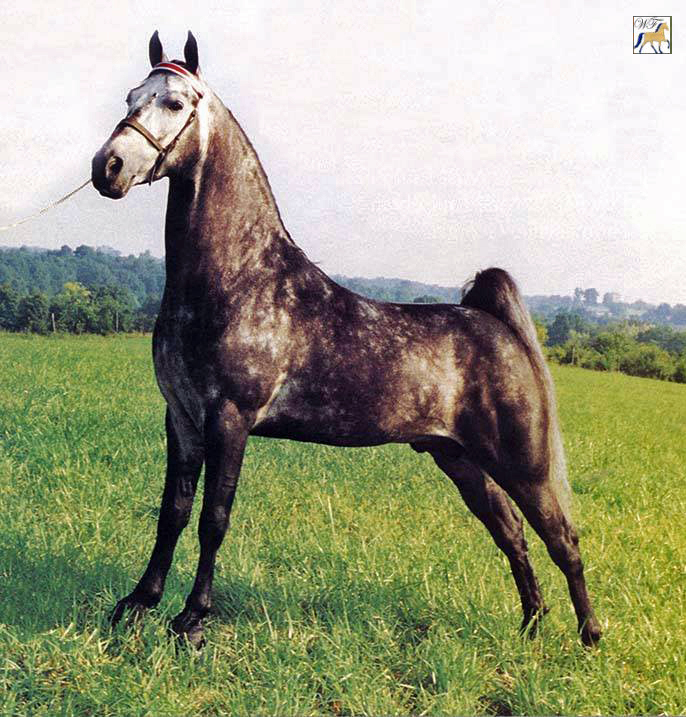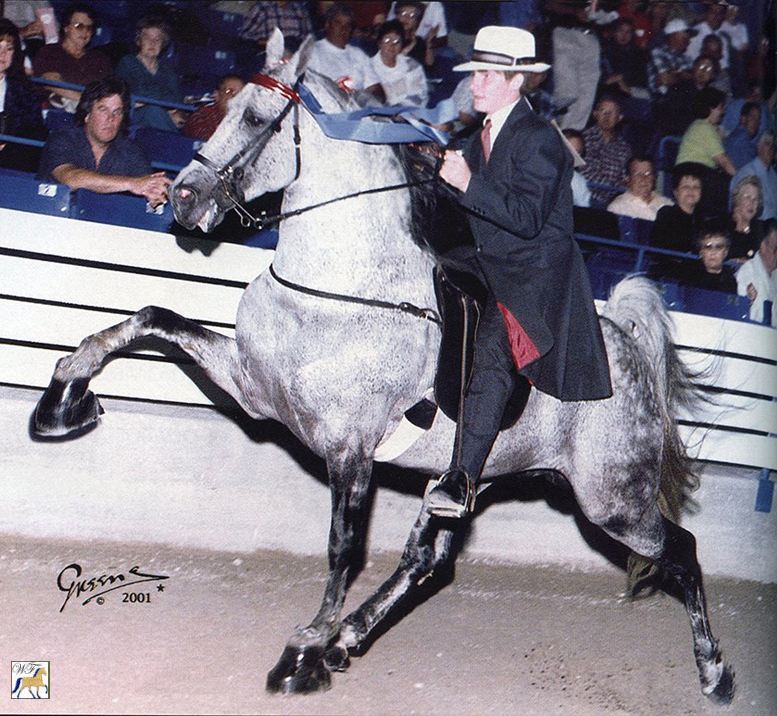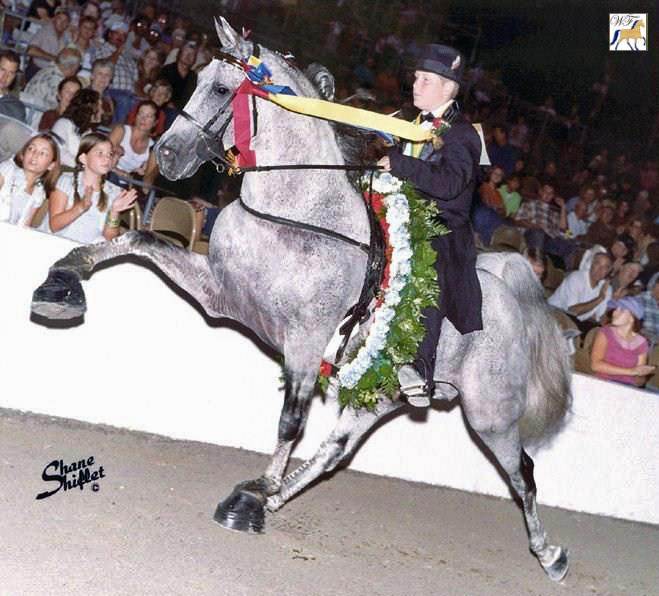 When
a new Tennessee walking horse arrived on Jack Way’s
farm 19 months ago, Way’s first inclination was to send
the horse back.
When
a new Tennessee walking horse arrived on Jack Way’s
farm 19 months ago, Way’s first inclination was to send
the horse back.
He had seen the dapple-gray stallion eight years
earlier when it won a World Grand Championship in Shelbyville,
Tenn.
But the horse that came off the trailer that cold
day in February hardly resembled a champion. He’d been
put out to pasture for stud service and hadn’t competed
in show competition in eight years.
“When we got him, he was about 350 pounds overweight,”
Way said. “He had a woolly coat, no grooming.”
“It looked like a Welch pony, he was so round and
fat,” said Johnny “Butch” Lewis, a trainer at Way’s
5 Way Farm in Coaling.
The fact that the horse wasn’t wearing the trademark
platform shoes that help accentuate the steps of Tennessee
walkers made him look even shorter and heavier.
“We went upstairs and found some shoes and put on
the first ones we found,” Lewis said.
From there, it was just a few trips down to the barn
before Way and Lewis, who had been working with Tennessee
walkers for 25 years, knew the horse was Silver Design,
winner of the Amateur 4 Year Old Grand Championship
in 1993.
“We could see that the athletic potential he had
shown years earlier was still there,” Way said.
With a rigid diet and training program, what transpired
during the next 18 months was one of the greatest comeback
stories in Tennessee walking horse/shistory.
Last month, after dropping more than 300 pounds,
Silver Design and rider Thad Way won the Owner-Amateur
Youth Riders on Ponies 60 inches and Under World Grand
Championship. Thad Way is Jack Way’s 17-year-old son.
The competition was held in Shelbyville at an event
known as The Celebration, the World Series of walking
horse competition.
“To come back in a different division with a different
rider, from the standpoint of that long of a layoff,
it’s a pretty big story,” said Mark McGee, who has/scovered
the Tennessee Walking Horse industry for 20 years. He
is editor of the Times-Gazette in Shelbyville, known
as the Tennessee Walking Horse Capital of the World.
Although The Celebration awarded World Grand Championships
in 31 classes, Silver Design and his rider put on a
standout performance.
 “That
horse made an incredible showing, and that young man
did an absolutely incredible job of presenting him,”
said Bob Cherry, executive director of the Tennessee
Walking Horse Breeders’ and Exhibitors’ Association.
“It was just, in my mind, one of the top four or five
horses in The Celebration.”
“That
horse made an incredible showing, and that young man
did an absolutely incredible job of presenting him,”
said Bob Cherry, executive director of the Tennessee
Walking Horse Breeders’ and Exhibitors’ Association.
“It was just, in my mind, one of the top four or five
horses in The Celebration.”
Throughout the competition, Thad literally had the
voice of his father in his ear, with Way dispensing
directions from a remote receiver into a headset his
son was wearing.
For Way, a 44-year-old Tuscaloosa insurance agent,
the event was the high point in a hobby that began at
age 6 when his father, recovering from heart surgery,
bought a few horses as a way to bring himself and his
son together.
“Emotionally, it was probably my greatest victory
in the horse business to see a kid of mine win it,”
said Way, who himself had won two championships as a
youth.
Way’s father died in 1986. But Way has continued
the family’s Tennessee Walking Horse tradition with
Thad and his other sons, Winston, 19, William, 11 and
Alex, 9.
Today, Way’s 40-acre farm is home to 120 Tennessee
Walkers. Some are owned by him while others are boarded
there for breeding or training purposes.
What began as a small hobby is now a big business,
all based on devotion to one breed of horse with a peculiar
birthright.
“What makes the Walking Horse a performance horse
is what’s called the running walk, which is the perception
that he’s running with his front legs and walking with
his back legs,” Way said. “They’re born with natural
ability. Their gait is one they actually come into this
world with.”
For Thad, the road to a World Grand Championship
meant afternoons of driving the 20 miles from East Central
High School to the Coaling farm to train for competitions
leading up to The Celebration.
Then there were weekends and summer months spent
cleaning stalls and performing other farm chores.
“This is pretty much what I call my sport to compete
in,” said Thad, a junior at East Central. “I’ve been
around it all my life.”
Besides the exacting demands of his father, Thad
also had the expectations of Lewis, the horse’s trainer,
to deal with. Lewis gave up his job at the Tuscaloosa
Veterans Affairs Medical Center two years ago to become
a full-time trainer for Way.
 “He’s
not easy on an individual,” Thad said of Lewis, as if
speaking both for himself and Silver Design.
“He’s
not easy on an individual,” Thad said of Lewis, as if
speaking both for himself and Silver Design.
But the high expectations and rigid training paid
off.
“The rider can really affect how the horse performs,”
McGee said. “He did a really good job of riding the
horse and that was the consensus of everybody. He rode
the hair off the horse,′ one trainer up here said.”
Next month, Thad and Silver Design will present the
colors at the International Tennessee Walking Horse
Championship in Murfreesboro, Tenn.
Plans for future competition are being weighed, though
no final decisions have been made.
“I’d be leaning toward him competing in the Celebration
again,” Jack Way said. “It’s hard to take a horse that’s
loved as much as he is at the time of his life and keep
him out of the show ring.”
One thing for certain: The win has rejuvenated Silver
Design’s breeding career. Way plans to increase the
horse’s stud fee from about $800 to $1,000.
“It doesn’t hurt its reputation any to have him come
back like that and win a World Grand Championship title,”
McGee said.
Way declined to reveal what he and partner Rex Critzer
of Franklin, Mich., paid for Silver Design. But he said
they have already exceeded their business plan of recouping
the horse’s purchase price through stud fees within
two years. Last year, the horse bred 100 mares.
Richard Garnes, who sold Silver Design to Way and
Critzer, says he doesn’t have any regrets about the
transaction. Garnes’ wife, Linda, rode the horse to
the 1993 championship.
“We’ve always loved the horse and felt that whatever
is best for the horse needed to happen,” Garnes said.
“As it turned out, what Jack did with the horse ...
couldn’t have been any better.”